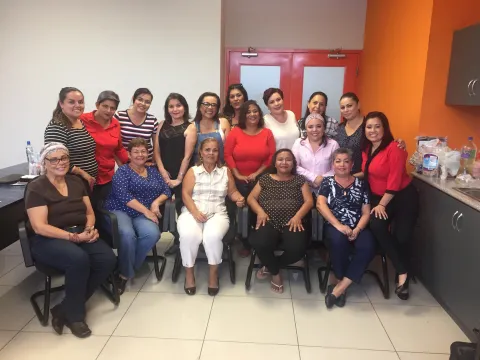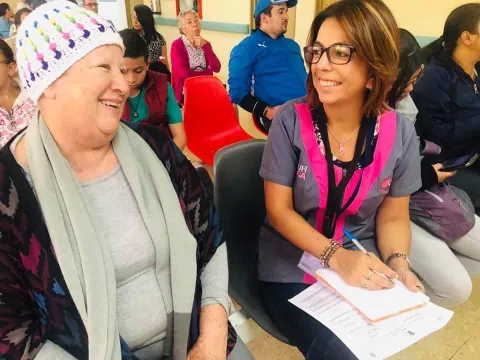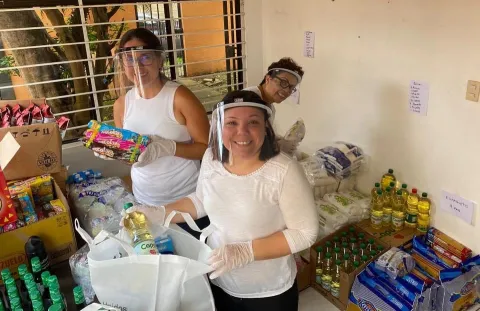Más Vida (More life)

Context
A breast cancer diagnosis is often accompanied by a series of challenges including changes to family dynamics, complications in the workplace and poor or non-existent social interactions, which can increase the vulnerability of the individual diagnosed, affect their self-esteem and general self-perception. When breast cancer is metastatic, these challenges often increase, creating additional stress and potential personal crises. In Costa Rica, the management and care of breast cancer patients is adapted specifically to those with advanced stage or metastatic disease. In addition, there is currently no data to determine the number of metastatic breast cancer (MBC) patients from the total number of breast cancer cases diagnosed per hospital, nor a team of actors that can directly address the challenges that these women face.

Tour Rosa is a non-governmental non-profit organisation that was founded in 2012. In 2020 it became Unidos contra el Cáncer to expand its reach and support to the cancer community of Costa Rica. The organisation is run by female cancer survivors and volunteers with the support of oncologists, and is focused on supporting women diagnosed with cancer, aiming to improve their quality of life and defend their rights. Since the organisation was founded, the organisation has helped over 9,500 cancer patients through the help of a team of 25 volunteers.
Project description
The project "Mas Vida" was awarded a SPARC grant in 2019 to enhance the quality of life of women living with MBC through education, peer-to-peer support, and psychosocial support.
The project aims at building a community of women as a space to discuss their MBC-related concerns, to educate the women on MBC and to offer psycho-oncological accompaniment to patients.

Tour Rosa created virtual support opportunities for patients, including a “Community of Women” which is a virtual support group enabling patients to talk openly about their experiences and feelings. This support was adapted to be virtual, rather than in-person, as a result of the Covid-19 pandemic. The support groups were held bi-weekly and led by two psycho-oncologists, a medical oncologist, and a moderator. The group allows patients to exchange ideas and support one another in their treatment journey. To recruit patients, Tour Rosa worked in partnership with Hospital Mexico and ACOMED and promoted the opportunity via social media.
Specific educational talks were given in the support groups in order that women could learn about specific topics linked directly to cancer diagnosis such as sexuality, nutrition, psycho-oncology, physiotherapy, oncology and Covid-19. Patients also had the opportunity to participate in various forms of alternative therapies such as music therapy, art therapy, and mindfulness.
In addition to this group support, Tour Rosa also offered individualised psycho-social support to MBC patients and their families. By doing so, they became aware that the pandemic had brought economic instability and financial hardship, and many patients were not able to travel to the hospital to access treatment or purchase enough food. In order to help ensure that patients could continue their treatment during the pandemic, the project was further adapted to provide transportation, food and hygiene products enabling individuals to focus on treatment without the concern that their basic needs would not be met.
Impact
The project succeeded in the three aims it set out to achieve. The foundation of this project was building a community of women to have a space for communication among peers; and through this virtual community to educate patients about treatment; and to offer psycho-oncological accompaniment for the strengthening of emotional capacity regarding some complex situations that arise with a diagnosis such as this. In the first year of the project, 84 women benefited from being part of the virtual community that was developed. Eighteen support groups were held, both in-person and virtual.

Additionally, through the support provided and as a result of the global pandemic, a fourth objective and need was identified, the provision of material support to patients. This was particularly critical for this group of individuals supported, in order to avoid the risk of infection on public transport and risk dropping out of treatment. 110 women received additional support through transportation services that were organised by the Tour Rosa Association to ensure they could attend chemotherapy and radiotherapy during the project period. The organisation continues to provide transportation services to support patients following the grant period.
In total, 140 patients were reached and supported through a combination of support groups, training sessions, psychological support, and support with transportation and delivery of basic supplies.
More about the project
- Organisation's website: Unidos contra el Cáncer
- TEDx talk by founder of Tour Rosa, Alexandra Nuñez: YouTube
- News article from UICC: Addressing metastatic breast cancer in the time of the coronavirus pandemic
- News story published in Costa Rica: 200 pacientes con cáncer reciben apoyo para no interrumpir tratamiento
(Information from the project description and context is compiled from the final SPARC report)
Last update
Friday 03 February 2023